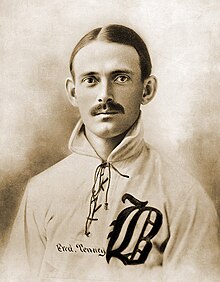| Fred Tenney | |
|---|---|
 | |
| First baseman / Manager | |
| Born: November 26, 1871 Georgetown, Massachusetts, U.S. | |
| Died: July 3, 1952 (aged 80) Boston, Massachusetts, U.S. | |
Batted: Left Threw: Left | |
| MLB debut | |
| June 16, 1894, for the Boston Beaneaters | |
| Last MLB appearance | |
| October 7, 1911, for the Boston Rustlers | |
| MLB statistics | |
| Batting average | .294 |
| Hits | 2,231 |
| Home runs | 22 |
| Runs batted in | 688 |
| Managerial record | 202–402 |
| Winning % | .334 |
| Teams | |
| As player
As manager | |
Frederick Tenney (November 26, 1871 – July 3, 1952) was an American professional baseball player whose career spanned 20 seasons, 17 of which were spent with the Major League Baseball (MLB) Boston Beaneaters/Doves/Rustlers (1894–1907, 1911) and the New York Giants (1908–1909). Described as "one of the best defensive first basemen of all time", Tenney is credited with originating the 3-6-3 double play and originating the style of playing off the first base foul line and deep, as modern first basemen do.[1][2] Over his career, Tenney compiled a batting average of .294, 1,278 runs scored, 2,231 hits, 22 home runs, and 688 runs batted in (RBI) in 1,994 games played.
Born in Georgetown, Massachusetts, Tenney was one of the first players to enter the league after graduating college, where he served as a left-handed catcher for Brown University. Signing with the Beaneaters, Tenney spent the next 14 seasons with the team, including a three-year managerial stint from 1905 to 1907. In December 1907 Tenney was traded to the Giants as a part of an eight-man deal; after two years playing for New York, he re-signed with the Boston club, where he played for and managed the team in 1911. After retiring from baseball, Tenney worked for the Equitable Life Insurance Society before his death in Boston on July 3, 1952.
- ^ Caruso, Gary (1995). Braves Encyclopedia. Temple University Press. pp. 30, 245. ISBN 978-1-56639-384-3.
- ^ Porter, David L. G. (2000). Biographical Dictionary of American Sports: Q–Z. Greenwood Publishing Group. p. 1528. ISBN 978-0-313-31176-5.